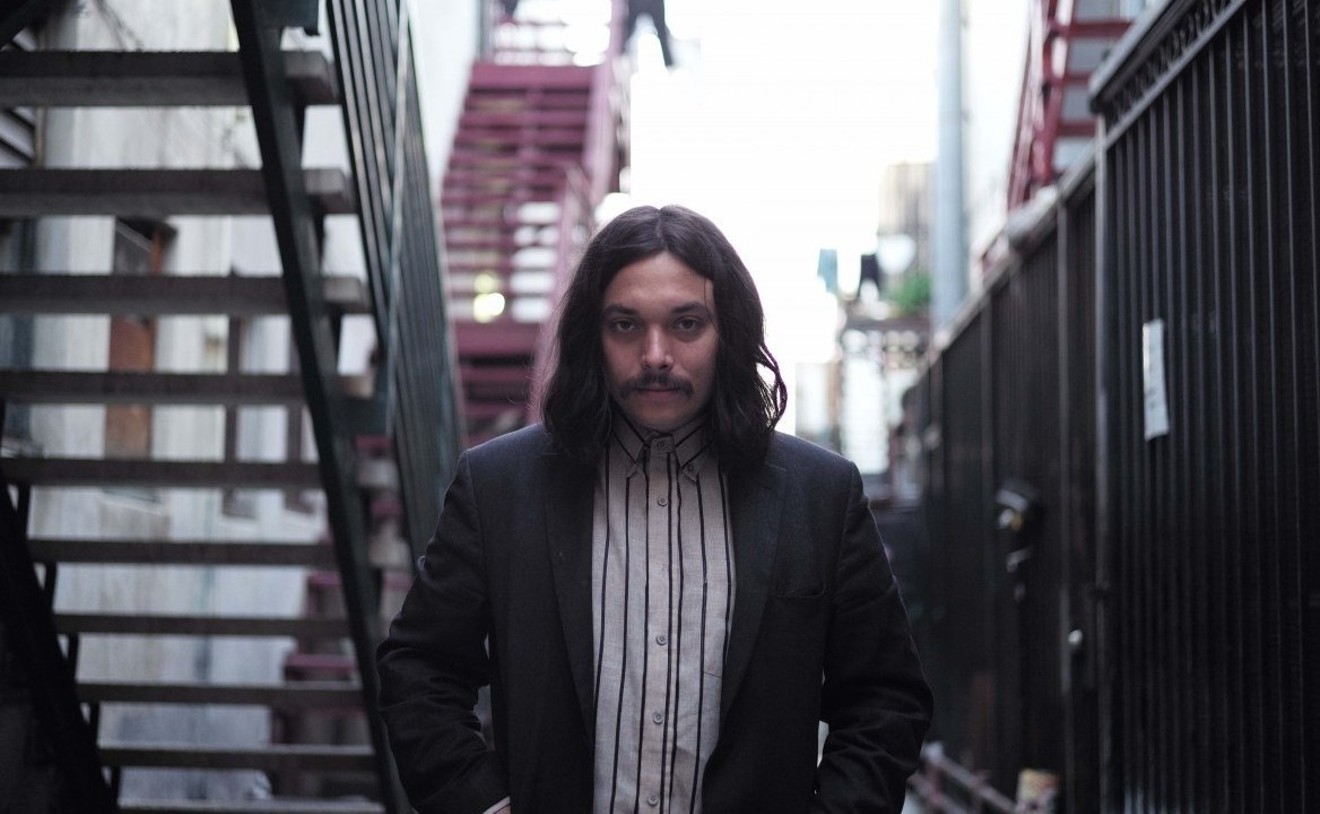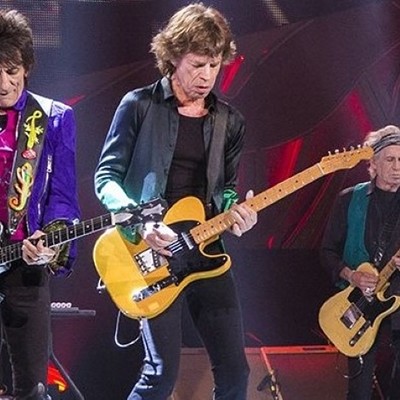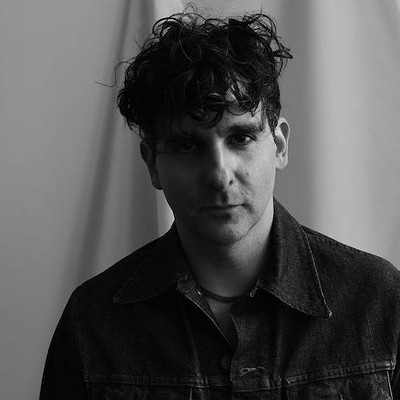Listening to the music of Drugdealer can feel like entering a time warp. The sparsity of the arrangements, the aridity of the production, and the classic pop melodies embedded in each tune immediately bring to mind the music of the 1960s and 1970s—a time when similar soft-rock sounds entrenched the AM airwaves of nearly every American town.
Strangely enough, it’s a sound that remains deeply ingrained in popular culture, with classic hit radio still occupying the presets of many, and with live tours from legacy acts like Fleetwood Mac and Dead & Company remaining as relevant as they ever were.
So what is it about the sound of the '60s and '70s that resonates with so many?
A week prior to setting out on his month-long U.S. tour, Michael Collins, lead-vocalist/mastermind of LA-based group, Drugdealer, talked to the Houston Press. When reached, Collins was enduring the ultimate American nightmare while queuing in line at the Los Angeles DMV. Despite such dire circumstances, Collins graciously opened up on his brief but successful career as Drugdealer, and the vintage sound that has become so associated with the project.
“Obviously it sounds good, that sound. I think it’s easy on the ears, and it’s tried and true. Time tested. People singing together, harmonizing together, and changes that scientifically relieve people of their woes.” Regarding his approach, Collins explains that, “it’s a conscious thing...I’m trying to tap into it like learning a language rather than deciding a style to do, and that’s a language that everybody speaks, whether they’re in Taiwan or New Jersey. They just like classic pop and classic rock.”
However, as Collins says, truth-telling also plays a role in the appeal of this sound.
“When you talk about this sound, you’re talking about a bunch of people that cared way more at that point about what they were saying instead of what they were playing. Now you get into a place where people care more about the way things are mastered or the way their Instagram is looking,” he says. “It’s the same thing with country music. There’s something cool about that music because it’s always just been about the songwriting. So I think that this kind of music is basically just middle of the road people trying to be intellectuals, but always battling the fact that maybe that country music style is maybe the most true. It’s like people in folk music are trying to think too much and then realizing that these other forms are timeless.”
Collins’ path to this point has been far from traditional. In 2009, after leaving art school to hop freight trains around the country, Collins settled in his hometown of Baltimore and began the experimental project by the name of Run DMT. With little to no musical training, his earlier work detailed a more electronic/sample-based sound. By 2013, he had taught himself both piano and guitar, relocated to Los Angeles, and infiltrated its underground scene with his next two projects, Silk Rhodes and Salvia Plath. While Silk Rhodes fell more along the spectrum of modern soul music, Salvia Plath is where we were first introduced to Collins’ traditional songcrafting ability, and the classic psych-pop sound that has since become associated with Drugdealer, who entered the picture in 2016 with its fantastic debut, The End of Comedy.
Though led by Collins' artistic vision, Drugdealer is considered more of a collective than it is a solo project, including frequent collaborators Sasha Winn on vocals, Shags Chamberlain on bass/production, and a host of rotating Los Angelites within Collins’ creative circle. In listening to The End of Comedy, it’s clear that this collective approach suits Collins, as he can implement his precise vision with the assistance of other skill sets.
“I never really set out to be really good at piano or guitar, and as it turns out I’m not, because intention is everything. But what I did set out to do was to know just enough to be an amateur at it, and just focus completely on the storytelling.
“The reason that I was first cultivating that sound was because I focus a lot on the lyrics, and I’m not the most natural player. It’s just a style of music that people work well together playing...it’s a simple, straight-ahead, lyric-based, vocal-based style of songwriting. It’s not that it’s trendy or anything in my eyes. It’s just how I’ve listened to music my whole life. That style of music is a language that I grew up fluent in."
This past April, Collins released Raw Honey, his second full-length offering under the Drugdealer moniker. Like its predecessor, Raw Honey is another well-played homage to artistic influences of the past. For instance, with tracks like “Lost In My Dream” and “London Nightmare,” a clear connection can be made with the early California psych-pop scenes of the '60s (a la Arthur Lee and Moby Grape), while upbeat tracks like “Fools,” give off more of a mid-'70s yacht-rock feel (a la Donald Fagen). Similar correlations can be drawn for nearly every Drugdealer tune. Tapping into vintage sounds is nothing new in today’s pastiche-enthralled world. Yet, doing so with Collins’ level of specificity and confidence is tough to come by.
Similar to The End of Comedy, the true intrigue behind Raw Honey are the many collaborating vocalists heard throughout the album. Whether it’s the addition of lo-fi country balladeer, Dougie Poole (in “Wild Motion”) or the rich alto of Natalie Mering aka Weyes Blood (in “Honey”), the album serves as a concoction of musicianship that holds its entertainment value for the entirety of its 35-minute run time. As Collins explains, his collaboration philosophy is rather straightforward—use the talent around him.
“Those are some of the people that I think are the best, and I was just lucky enough to naturally be in a creative zone with them. You have to cut your teeth writing some things that you can’t even sing, and that’s just what I did. In the case of Natalie, sometimes I just write something really good and be like ‘I don’t want to do this. I think someone better should do this.’ When it comes to someone better, there's really not many people better than her. That’s kind of how simple it is. Yeah, she’s got a magical voice.”
Most of those familiar with Collins know that skate boarding culture has played an influential role in the existence of Drugdealer. Aside from frequently sharing skate clips while touring, the self-described “skate rat” has invited several prominent skateboarders to be a part of the Drugdealer collective, including Kenny Anderson (on trumpet) and Danny Garcia (on guitar). As everything in Collins' career seems to transpire, his partnership with the skate world came about rather organically.
“I spend more time skating than playing music...so it’s just natural that I would meet the people in that world that play music and that like my music,” he says. “Part of the reason that I like a lot of the sounds that I’ve cultivated, is because of the songs that [skateboarders] choose. In the case of Danny Garcia, he’s one of the people that pushed for certain songs of the '60s in his video parts, and him along with some other skaters, and music supervisors for those companies, they put a lot of cool music in my ears when I was a little kid. I honestly think that’s more important to me than my parents playing that music, or anyone else, because I looked up to those videos more than anybody. So it seems really weird and serendipitous that I would be making music with some of these people that I looked up to...but also I listened to what they listened to so it kind of makes perfect sense.”
Drugdealer Live in Houston is scheduled for 8 p.m. July 13 at Satellite Bar, 6922 Harrisburg. $12. All Ages
Support Us
Houston's independent source of
local news and culture
account
- Welcome,
Insider - Login
- My Account
- My Newsletters
- Contribute
- Contact Us
- Sign out

For Michael Collins, simplicity is the key ingredient for the '70s-tinged soft-rock sounds of Drugdealer.
Photo by Joseph McMurray
[
{
"name": "Related Stories / Support Us Combo",
"component": "11591218",
"insertPoint": "4",
"requiredCountToDisplay": "4"
},{
"name": "Air - Billboard - Inline Content",
"component": "11591214",
"insertPoint": "2/3",
"requiredCountToDisplay": "7"
},{
"name": "R1 - Beta - Mobile Only",
"component": "12287027",
"insertPoint": "8",
"requiredCountToDisplay": "8"
},{
"name": "Air - MediumRectangle - Inline Content - Mobile Display Size 2",
"component": "11591215",
"insertPoint": "12",
"requiredCountToDisplay": "12"
},{
"name": "Air - MediumRectangle - Inline Content - Mobile Display Size 2",
"component": "11591215",
"insertPoint": "4th",
"startingPoint": "16",
"requiredCountToDisplay": "12"
}
,{
"name": "RevContent - In Article",
"component": "12527128",
"insertPoint": "3/5",
"requiredCountToDisplay": "5"
}
]
KEEP THE HOUSTON PRESS FREE...
Since we started the Houston Press, it has been defined as the free, independent voice of Houston, and we'd like to keep it that way. With local media under siege, it's more important than ever for us to rally support behind funding our local journalism. You can help by participating in our "I Support" program, allowing us to keep offering readers access to our incisive coverage of local news, food and culture with no paywalls.
Trending Music
- How Much Longer Can Classic Rock Rule the Roost?
- Top 10 Butt-Rock Bands of All Time
- Houston Concert Watch 4/24: Rolling Stones, Bad Bunny and More
-
Sponsored Content From: [%sponsoredBy%]
[%title%]

Don't Miss Out
SIGN UP for the latest
Music
news, free stuff and more!
Become a member to support the independent voice of Houston
and help keep the future of the Houston Press FREE
Use of this website constitutes acceptance of our
terms of use,
our cookies policy, and our
privacy policy
The Houston Press may earn a portion of sales from products & services purchased through links on our site from our
affiliate partners.
©2024
Houston Press, LP. All rights reserved.




